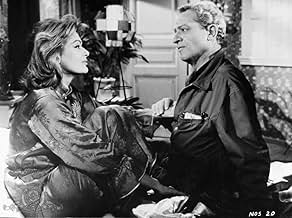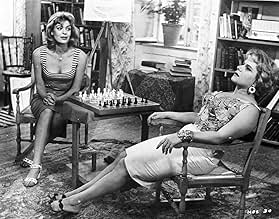AVALIAÇÃO DA IMDb
7,3/10
6,4 mil
SUA AVALIAÇÃO
Adicionar um enredo no seu idiomaAn American scholar in Greece sets about improving the prostitute with whom he is infatuated.An American scholar in Greece sets about improving the prostitute with whom he is infatuated.An American scholar in Greece sets about improving the prostitute with whom he is infatuated.
- Ganhou 1 Oscar
- 3 vitórias e 8 indicações no total
Giorgos Foundas
- Tonio
- (as Georges Foundas)
Dimitris Papamichael
- British Seaman
- (as Dimitri Papamichael)
Thanasis Vengos
- Thanasis
- (as Thanassis Veggos)
Avaliações em destaque
Never on Sunday is a beautiful, down to earth, romantic comedy. It's a feel-good movie without the Hollywood over-sweetness. A well to do American is educated by a Greek courtesan who is not so sophisticated but full of life. And life proves to be more important then money or sophistication. And there even is a happy ending even though is one with a tear, if you a a sucker for such things. The music is prefect. The title-song is just great. The scenery makes you want to got to Greece for your next holiday. In an nutshell; this is one Greek Delight. Watch it on a cold Sunday and you'll get all warm inside. Watch it on a hot summers-night and you'll believe your in Greece already.
Jules Dassin has directed a delightful film starring Melina Mercouri as the happy whore with the heart of gold. As wonderful as Mercouri is, and she is wonderful, Dassin is a disaster, whose performance almost destroys his film. Clearly the low budget with which the film was made prevented his obtaining another English-speaking actor for the main male role.
Dassin, I'm sad to say, is the only actor in the film who has absolutely no personality. He comes across with all the dynamism of a dead log. How lucky we are that Ms Mercouri, who won best actress at the Cannes film festival for her role here, was at the top of her form. Without her, the film would have been forgotten decades ago. As it is, it remains a classic.
Dassin, I'm sad to say, is the only actor in the film who has absolutely no personality. He comes across with all the dynamism of a dead log. How lucky we are that Ms Mercouri, who won best actress at the Cannes film festival for her role here, was at the top of her form. Without her, the film would have been forgotten decades ago. As it is, it remains a classic.
Melina Mercouri takes an often-played role - the 'Whore with a Heart of Gold who Loves Life Despite It All' - and makes it her career-defining movie role, and she is the entire reason to watch the movie. Fiercely independent, sexually progressive, not spending her life trying to find the perfect man and gorgeous, she's a force of life.
Jules Dassin has directed a great movie but he should have hired an actor to play Homer, and not played it himself. He almost ruins all the charm the movie has going for it with his ineffective acting, bad line readings and stupid motivations. A better actor might have found a way around the rough spots but Dassin magnifies them.
Mercouri probably should have won Best Actress that year, but who can beat a Liz Taylor death scare? Plus Simeone Signoret had won Best Actress the year before, and Sophia Loren would win the following year..you don't want to upset icons like Louella Parsons, Frank Sinatra and John Wayne by giving ALL the Oscars to foreigners, do you?? Maybe the fact that she does not die at the end was too much..we all know the odds of longevity for a hooker in a Hollywood movie. Taylor met that criteria, as if she needed to help her own odds after almost dying of pneumonia.
Worth watching for sure. 8/10.
Jules Dassin has directed a great movie but he should have hired an actor to play Homer, and not played it himself. He almost ruins all the charm the movie has going for it with his ineffective acting, bad line readings and stupid motivations. A better actor might have found a way around the rough spots but Dassin magnifies them.
Mercouri probably should have won Best Actress that year, but who can beat a Liz Taylor death scare? Plus Simeone Signoret had won Best Actress the year before, and Sophia Loren would win the following year..you don't want to upset icons like Louella Parsons, Frank Sinatra and John Wayne by giving ALL the Oscars to foreigners, do you?? Maybe the fact that she does not die at the end was too much..we all know the odds of longevity for a hooker in a Hollywood movie. Taylor met that criteria, as if she needed to help her own odds after almost dying of pneumonia.
Worth watching for sure. 8/10.
SYNOPSIS: A well educated American tourists attempts to 'enlighten' a Greek prostitute in a small seaside village.
CONCEPT IN RELATION TO THE VIEWER Newer is not always better, and sometimes over analyzing a problem can only make it worse. Leave well enough alone. It is more important to be happy than to understand everything.
PROS AND CONS Every recent prostitute film from 'Irma la Duce' to 'Pretty Woman' owes a lot to this work. It was one of the first films that shed light on the idea that prostitution was a respectable and acceptable way to make a living.
If nothing else this film is a homage by Jules Dassin to his wife, Melina Mercouri. She is the focus of the film and she captivates any scene she is in with her zest for life and smoldering sexuality. The other thing you tend to fall in love with is the romantic ideal of living in Greece in 1960. It appears care free, relaxed and almost infectious with its love of the simple life.
The plot of the film is not overly complex and deals with an outsider, Homer (Dassin) arriving in town to study Greek culture. He is almost immediately captivated by Ilya (Mercouri) as one of the local prostitutes that 'freelances' and does not work for the town pimp. She negotiates a price with whomever she chooses, and sleeps with all the towns vendors in exchange for her daily goods (food, wine, drinks, etc), but she never 'works' on Sunday. Hence the title to the film.
Homer is smitten by Ilya and decides that he must 'save' her from what he perceives as a wretched life that is going no where and decides to educate her so that she can see the error of her ways. In the end, this does nothing but frustrate everyone in town. The education of Ilya does have a silver lining, which if anything, leaves the town more corrupted than when Homer found it.
The underlying theme of the film is that one should strive to be happy in what you do and more importantly, who you know. There is an interconnection between people in a small town, and disrupting those connections may lift some people up, but is not good for the whole of society. Regardless of his meddling, the towns people never turn on Homer, or blame him for anything. At their core, they know that life is to be enjoyed and blaming people for your troubles is just not part of the mix.
CONCEPT IN RELATION TO THE VIEWER Newer is not always better, and sometimes over analyzing a problem can only make it worse. Leave well enough alone. It is more important to be happy than to understand everything.
PROS AND CONS Every recent prostitute film from 'Irma la Duce' to 'Pretty Woman' owes a lot to this work. It was one of the first films that shed light on the idea that prostitution was a respectable and acceptable way to make a living.
If nothing else this film is a homage by Jules Dassin to his wife, Melina Mercouri. She is the focus of the film and she captivates any scene she is in with her zest for life and smoldering sexuality. The other thing you tend to fall in love with is the romantic ideal of living in Greece in 1960. It appears care free, relaxed and almost infectious with its love of the simple life.
The plot of the film is not overly complex and deals with an outsider, Homer (Dassin) arriving in town to study Greek culture. He is almost immediately captivated by Ilya (Mercouri) as one of the local prostitutes that 'freelances' and does not work for the town pimp. She negotiates a price with whomever she chooses, and sleeps with all the towns vendors in exchange for her daily goods (food, wine, drinks, etc), but she never 'works' on Sunday. Hence the title to the film.
Homer is smitten by Ilya and decides that he must 'save' her from what he perceives as a wretched life that is going no where and decides to educate her so that she can see the error of her ways. In the end, this does nothing but frustrate everyone in town. The education of Ilya does have a silver lining, which if anything, leaves the town more corrupted than when Homer found it.
The underlying theme of the film is that one should strive to be happy in what you do and more importantly, who you know. There is an interconnection between people in a small town, and disrupting those connections may lift some people up, but is not good for the whole of society. Regardless of his meddling, the towns people never turn on Homer, or blame him for anything. At their core, they know that life is to be enjoyed and blaming people for your troubles is just not part of the mix.
Middle-aged American scholar Jules Dassin (as Homer) goes from Connecticut to a Greek sea port, where he discovers vivacious thirty-something prostitute Melina Mercouri (as Ilya). As he soaks up local culture, Mr. Dassin decides to play "Pygmalion" with Ms. Mercouri. Speaking about morality and happiness, Dassin wants Mercouri to cleave only unto him; but, that means she must give up her regular seamen, including handsome Giorgos Foundas (as Tonio) and the occasional lonely young sailor. Mercouri is happy with her pleasure-driven lifestyle. Dassin wants her to change
Dassin wrote and directed "Never on Sunday" for the actress he loved. The film won Mercouri the "Best Actress" prize at the film's celebrated "Cannes Film Festival" opening. She went on to receive similar consideration from the "New York Film Critics" (her performance was #8), and nominations from the US and UK Academies. Dassin and the music also received many honors. In the end, Mercouri and the music are the film's main assets.
The excellent Manos Hatzidakis title song was an easy listening hit for several recording stars, worldwide; collectively, the song must have sold many millions during 1960-61. My grandfather and mother liked the more innocent stereo LP version by Connie Francis. MGM made sturdy record albums; it still plays.
****** Never on Sunday (5/25/60) Jules Dassin ~ Melina Mercouri, Jules Dassin, Giorgos Foundas, Titos Vandis
Dassin wrote and directed "Never on Sunday" for the actress he loved. The film won Mercouri the "Best Actress" prize at the film's celebrated "Cannes Film Festival" opening. She went on to receive similar consideration from the "New York Film Critics" (her performance was #8), and nominations from the US and UK Academies. Dassin and the music also received many honors. In the end, Mercouri and the music are the film's main assets.
The excellent Manos Hatzidakis title song was an easy listening hit for several recording stars, worldwide; collectively, the song must have sold many millions during 1960-61. My grandfather and mother liked the more innocent stereo LP version by Connie Francis. MGM made sturdy record albums; it still plays.
****** Never on Sunday (5/25/60) Jules Dassin ~ Melina Mercouri, Jules Dassin, Giorgos Foundas, Titos Vandis
Você sabia?
- CuriosidadesFeatures first song ("Never On Sunday") from a foreign-made movie to win an Oscar.
- Erros de gravaçãoAt their first meeting, when Ilya looks at Homer through the viewfinder of his camera, he is looking straight-on at the camera. But when she looks up from the camera, Homer is sitting slightly to her left and has to turn to his right -- and thus is not looking straight-on -- when he speaks to her.
- ConexõesFeatured in Toute la chanson: Episode dated 30 May 1960 (1960)
Principais escolhas
Faça login para avaliar e ver a lista de recomendações personalizadas
- How long is Never on Sunday?Fornecido pela Alexa
Detalhes
- Data de lançamento
- País de origem
- Central de atendimento oficial
- Idiomas
- Também conhecido como
- Never on Sunday
- Locações de filme
- Empresa de produção
- Consulte mais créditos da empresa na IMDbPro
Bilheteria
- Orçamento
- US$ 151.000 (estimativa)
- Tempo de duração
- 1 h 31 min(91 min)
- Cor
- Mixagem de som
- Proporção
- 1.66 : 1
Contribua para esta página
Sugerir uma alteração ou adicionar conteúdo ausente






































